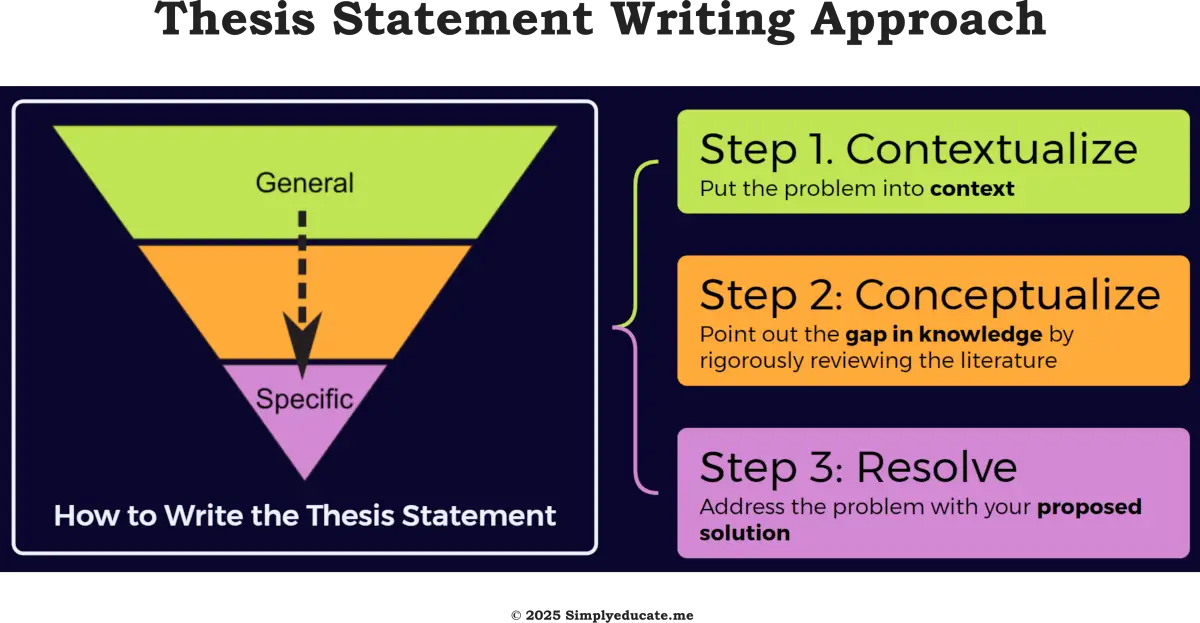Updated: 13 August 2025

Many students have difficulty understanding how to write a thesis statement. This challenge is common among those who have not yet learned a systematic approach to tackling this crucial part of a thesis proposal.
I will share a clear and practical method for writing a thesis statement — one that will help you overcome the uncertainty and confusion that often slow down the proposal-writing process.
By following the steps I outline here, you can write with confidence and move on to your next chapter in no time. Even if you’ve struggled before, this guide will show you that crafting a strong thesis statement is not as intimidating as it seems.
Table of Contents
What is a thesis statement?
Before we go into the steps on how to write a thesis statement, we must first define what it is. Defining the concept ensures that we share a common understanding from the outset, making the discussion clearer and more meaningful.
A thesis statement is the central argument or claim of a research work, expressed clearly and concisely. In shorter essays or papers, it is often written as a single sentence. In longer works such as theses or dissertations, it may extend to two sentences—the first stating the main claim, and the second briefly outlining the key points or scope that support or limit that claim. In either case, a strong thesis statement is the product of insightful reading and careful observation of the subject matter.
A thesis statement is the central argument or claim of a research work, expressed clearly and concisely.
The statement you make is not just a random position but a well-thought-out one, grounded in objective judgment and empirical evidence. Empirical means verifiable through observation or experience. Your thesis statement is your “educated” point of view—your proposed explanation of the phenomenon after critically examining the evidence at hand. Ask yourself: Are there convincing pieces of evidence that can support your contention?
From this definition, it follows that you must read a substantial amount of literature to understand how others have viewed, explored, tested, and verified the phenomenon you are investigating. Reading extensively not only broadens your perspective but also helps you identify the specific problem areas you need to address, thus narrowing down your research topic.
If a review of literature on your subject already exists like a systematic literature review or meta-analysis, that is an ideal starting point. A strong thesis statement arises from how deeply you have familiarized yourself with the research topic. You should aim to become an authority in the research area you have chosen to focus on.
How to Write a Thesis Statement: A Clear, Step-by-Step Guide
If you’ve ever wondered how to write a thesis statement that clearly presents your main idea, you’re not alone. Many undergraduate and graduate students — and even some teachers who have had little exposure to research — find this part of thesis writing tricky. A thesis statement should not just state your topic; it should summarize your main argument or claim and prepare the reader for what follows.
In this article, I’ll share a practical way to create a strong thesis statement using the general-to-specific (or inverted pyramid) approach. This method will help you organize your introduction logically and lead your readers naturally to your central argument.
Why the General-to-Specific Approach Works
Seasoned writers often use a deductive style in their introductions — starting broad and gradually narrowing the discussion (general to specific in research parlance) until they arrive at their main point. This flow helps readers understand the background before confronting the specific argument.
For students new to research writing, this structure can be a game-changer. It works because it mirrors how our minds process new information: we need context before detail.
The Inverted Pyramid Method
Imagine your introduction as an inverted pyramid. You begin with the broad context at the top and gradually move toward the narrow tip — your thesis statement.
This approach works in three stages:
1. Contextualize
Start by setting the scene for your topic. Provide just enough background so readers understand why the subject is important.
A simple trick is to use the 5Ws and 1 H approach:
- What is the topic about?
- When does it occur or matter?
- Where does it take place?
- Who is involved?
- Why is it significant?
- How does it work or happen?
For example, if your thesis is about the effects of online learning on student performance, you might first discuss the rise of online education globally, its adoption in schools, and its relevance in the current academic landscape.
2. Conceptualize
Here, you move from background to identifying the problem or gap in knowledge. This is where critical thinking kicks in. Ask yourself:
- What is already known about the topic?
- What’s missing or unclear?
- Have I read enough to identify what needs further study?
This stage often involves a literature review to ensure your argument isn’t simply repeating someone else’s work.
Your goal is to prepare readers for your thesis statement by showing them the logical path from general background to the specific problem.
3. Resolve
Finally, state your main argument or claim — your thesis statement. This is the single sentence (or sometimes two) that clearly tells the reader what you will argue or give evidence in your paper.
A strong thesis statement should:
- Be clear: avoid vague words like “some” or “interesting.”
- Be specific: focus on one main idea.
- Be arguable: it should express a claim, not just a fact.
Simple Examples on How to Write a Thesis Statement:
- Example 1: Weak thesis statement: “Online learning is common in schools today.”
- Example 2: Strong thesis statement: “Online learning improves student performance in higher education by providing flexible schedules, personalized pacing, and increased access to diverse learning resources.”
- Example 3 — One-Sentence Thesis Statement (for a short paper): “Urban community gardens improve local food security by increasing access to fresh produce, fostering social cohesion, and promoting sustainable land use.”
- Example 4 — Two-Sentence Thesis Statement (for a thesis or dissertation): “Urban community gardens improve local food security by increasing access to fresh produce, fostering social cohesion, and promoting sustainable land use. This study examines three case studies in Metro Manila to identify the specific policies, community practices, and design features that contribute most to these outcomes.”
This way, your readers see that the core argument stays clear, but the two-sentence format gives extra room for scope and focus in longer works.
Once you have your thesis statement, the rest of your introduction should naturally lead into your research questions and methods.
A Real-Life Example
Application of the Deductive Approach on How to Write a Thesis Statement in the Introduction
[Note: The real issue or problem that served as the basis of this proposed study is found here: How are Research Topics Identified? Lessons from Sea Level Rise in Palawan]
Title of thesis proposal: “Socioeconomic Resilience of Rural Farming Communities to Coastal Flooding in Tectonically Active Regions: The Case of Abongan, Taytay, Palawan”
Introduction
[CONTEXTUALIZATION]
In Abongan, a rice-farming village in Taytay, Palawan, gradual coastal flooding has permanently submerged nearly 200 hectares of once-productive farmland. These areas, formerly yielding substantial rice harvests, are now dominated by mangrove growth — a visible marker of the community’s lost agricultural base. The loss translates to an estimated ₱21 million in annual agricultural production, with net losses of around ₱10.5 million each year.
While such flooding is often assumed to be caused by climate change–induced sea level rise, geological evidence suggests a more complex explanation. A study by Maeda et al. (2004) found that differences in relative sea-level histories across various Philippine sites — including Palawan — could be explained by regional tectonics and possibly by the response of the Earth’s crust to hydro-isostasy.
In simple terms, regional tectonics refers to the vertical movement of the Earth’s crust due to plate activity. In some places, the crust may sink (subsidence) or rise (uplift), altering the local relationship between land and sea. Hydro-isostasy describes how the crust bends or adjusts in response to changes in ocean water mass — for example, sinking slightly when ocean water increases after ice sheets melt. Together, these processes can cause flooding in coastal areas independently of present-day climate change.
[CONCEPTUALIZATION]
For Abongan, this means the persistent inundation may result from long-term geological processes, such as slow crustal sinking or coastal warping, rather than recent human-driven sea level rise. However, the exact cause remains uncertain and requires further investigation.
Regardless of origin, the socioeconomic consequences for the community are severe: declining agricultural productivity, loss of income, and greater vulnerability to food insecurity. Local responses so far — such as shifting to other crops, building makeshift barriers, or seeking non-farm livelihoods — have been largely reactive and insufficient for ensuring long-term stability.
[RESOLUTION]
Against this backdrop, the proposed study aims to examine how rural farming communities like Abongan can strengthen their socioeconomic resilience to persistent coastal flooding in tectonically influenced regions. The focus is on identifying adaptive land-use practices, diversified livelihood strategies, and institutional supports that enable communities to cope with and recover from flooding impacts.
This study argues that the socioeconomic resilience of rural farming communities facing coastal flooding in tectonically active regions depends on the integration of adaptive agricultural practices, sustainable livelihood diversification, and targeted institutional interventions that collectively reduce vulnerability and promote long-term community viability.
Thesis Statement: This study argues that the socioeconomic resilience of rural farming communities facing coastal flooding in tectonically active regions depends on the integration of adaptive agricultural practices, sustainable livelihood diversification, and targeted institutional interventions that collectively reduce vulnerability and promote long-term community viability.
Now, it’s up to you to make a rigorous review of literature to strengthen your argument focusing on published, peer-reviewed research on adaptive agricultural practices, sustainable livelihood diversification, and institutional interventions.
Final Word
Knowing how to write a thesis statement isn’t just about putting words together — it’s about leading your reader from broad background knowledge to a precise, arguable claim. The inverted pyramid approach helps you do just that by:
- Giving context.
- Identifying a gap.
- Stating your argument clearly.
With practice, this method will help you write thesis statements that are strong, persuasive, and crystal clear.
Literature Cited
Maeda, Y., Siringan, F., Omura, A., Berdin, R., Hosono, Y., Atsumi, S., & Nakamura, T. (2004). Higher-than-present Holocene mean sea levels in Ilocos, Palawan and Samar, Philippines. Quaternary International, 115, 15-26.
©2015 January 1 P A Regoniel | Updated 13 August 2025




Thanks Regoniel. I too need some help in writing my conceptual framework. My topic is “Genetic and Socio-economic characterisation of African Indigenous vegetables in the urban and peri-urban production systems of Uganda.
Thanks so much
I would like to support about conceptual framework,thank so mach.
Thank you very much I was struggling to differentiate between theoretical and conceptual framework in a study
Your expose explains this very clearly
Thanks Regoniel for you writing. It will hep the researcher a lot. I need some help from you. My research topic is ‘Enforcement of Maritime Claims: Admiralty Jurisdiction and Arrest of Ships’. Please help me to develop the conceptual framework.
Regards
H. Jewel
This is a very good article and easy to understand, this helps me a lot in understanding how to write a good and effective thesis statement.
I’m glad to be of help Ishtee.
excuse me sir I need helping about making conceptual framework in my (topic the impact of recruitment and strategic selection on employee performance ) thanks
Dear Abdirrahman,
Thank you for reading. Your dependent variable is employee performance while recruitment and selection is your independent variable. Just find a way to measure these variables.
Dear Ramkumar, your kind comment renews my resolve to write more articles like this despite my now very busy schedule. I hope to post another useful article soon.
Hi,
Thank you. This piece of information came in handy to me. I was helping someone write a research interest document.
Good explanation and you have provided sample example statements. I was able to gain some insight and develop my own research statements.
It was very helpful. Enjoyed reading through your post.
Cheers, Ramkumar